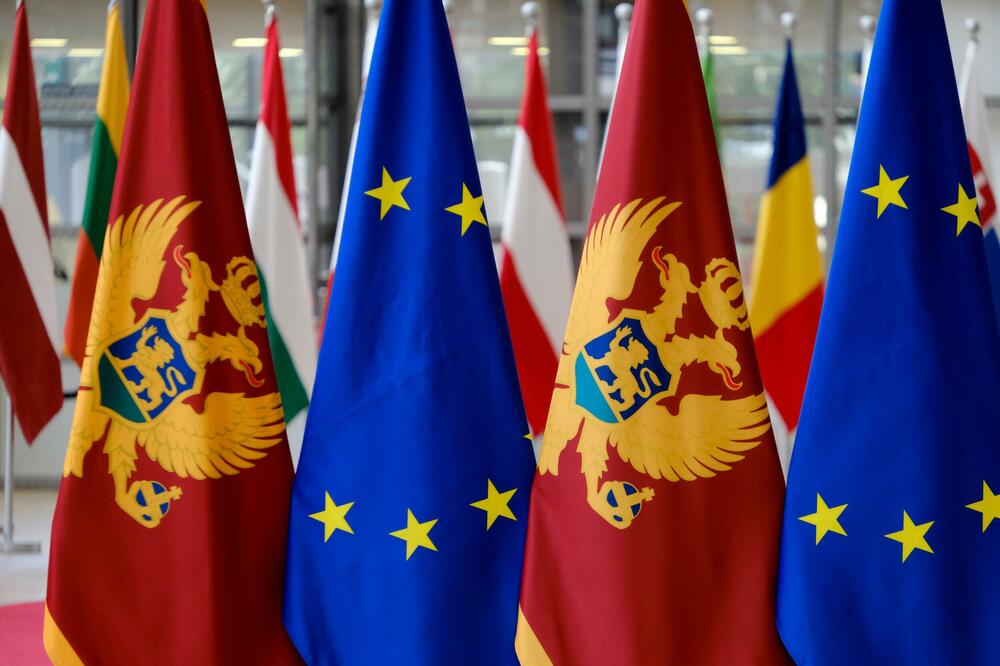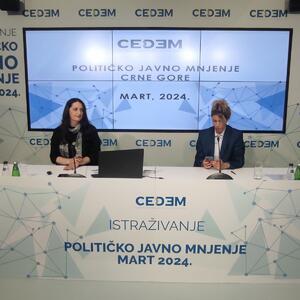Support for Montenegro's entry into the European Union (EU) and membership in NATO has increased since the removal of the three-decade-old government of the Democratic Party of Socialists (DPS) in August 2020, and the number of pro-Western citizens has increased by over 10 percentage points compared to 2021. year, according to public opinion surveys by the Center for Democracy and Human Rights (CEDEM).
According to their research from August 2020, conducted in the last days of the DPS rule, support for Montenegro's entry into the EU was 54 percent, and since then it has been constantly growing, and today it is 78 percent, judging by the results of the survey presented yesterday by CEDEM from March 5 to 19.
When it comes to NATO, which Montenegro joined in 2017, support for membership is also growing, but with slight oscillations. In August 2020, it was 37,7 percent, and today it is 49,5 percent. In the first survey after the fall of DPS, carried out in December 2021, support for the Alliance increased to 46,3 percent, in the next one, in December 2022, it fell to 43,8 percent, and in May of last year it increased to 46,7 percent, and according to the afternoon survey - it amounts to 49,5 percent.
Research by CEDEM shows that as of June 2021, the number of pro-Western-oriented citizens has increased from 40,1 to 50,3 percent, and the "mixed type", that is, the number of citizens who "look" to both the West and the East, has increased from 17,2 to 32,8 percent. "Non-Western orientation" decreased from 17,8 to 13,5 percent.
As a sign of the increased support of citizens for European integration, it is possible that the Ministry of European Affairs, headed by Maida Gorčević, was rated as the best of all departments of the Government of Milojko Spajić, which 36,4 percent of respondents rated as very and mostly good.
Almost 83 percent of the respondents cited membership in the EU as their first and second choice of foreign policy priority (71,4 and 11,5 percent), and more than half of them believe that in foreign policy, Montenegro should largely or completely rely on that organization. Strengthening membership in NATO was cited by 4,2 percent of respondents as their first choice, and by 34,6 percent as their second choice. The rapprochement of Montenegro with Russia was chosen as the first choice by 3,8 percent of citizens, and slightly more than a fifth as the second. When it comes to the rapprochement of Montenegro with Serbia, 16,2 percent of respondents marked it as the first choice, and 16 as the second choice.
Until December 2020, the country was governed by the government of Duško Marković, when the government of Zdravko Krivokapić was elected, which was voted out of confidence in February 2022. Krivokapić was succeeded as prime minister in April of that year by Dritan Abazović, whose government was voted in by the votes of the DPS, the Social Democratic Party (SDP), the minority parties, the Socialist People's Party (SNP) and the Citizens' Movement (GP) of the URA, and after the extraordinary elections last June, executive power was exercised by the current government of Milojko Spajić from November 1.
One of the founders of the Preokret movement, Srđan Perić, told "Vijesta" that with the change of government, "it became clear that, regardless of who is the prime minister, president of the state or parliament, Montenegro is in the process of EU integration and is a member of NATO."
"There is almost a consensus on the political scene for EU integration and it is often associated with an increase in the standard of living, so a high level of support is quite expected. When it comes to the attitude towards NATO, the more rational rhetoric and individual approaches to the affirmation of this alliance, sometimes milder - sometimes stronger, of those who expressed reservations about membership certainly have their consequences. In the end, when a significant part of those who made a bogey out of that membership are no longer doing so or are promoting it, it obviously reflects on the citizens whose political leaders they are," says Perić.
More than three-quarters of respondents chose the struggle for a better standard of living and new jobs as their first choice of internal political priorities, while 12,5 percent of them stated it as their second choice. In second place is the fight against crime and corruption, which was chosen as the first choice by 12,2 percent, and as the second choice by slightly more than a third of them.
Compared to last year's survey, concern about the economic stability of the country increased from 32,4 percent to 44,9 percent, and concern about the strengthening of the influence of the Serbian Orthodox Church on the country decreased from 27 percent to 24,5 percent. There was a slight increase in concern due to the strengthening of the influence of Serbia, that is, Russia in Montenegro, and a decrease due to threats to independence and revanchism towards political dissidents.
The resignation of the President of Montenegro, Jakov Milatović, from all party positions, is rated by 30,4 percent of citizens as a good decision, and 21,9 percent as a bad one.
Almost two-thirds of citizens believe that the effects of the "Europe Now 1" program did not contribute to the standard of citizens, but that price increases are the same or higher than wage increases, while 22 percent of them believe that the standard has increased.
When it comes to the "Europe Now 2" program, about a third of the respondents believe that this program does not exist, 23,3 percent of them believe that it will be implemented during the mandate of this government, and 17,1 percent that the program is being implemented now.
When it comes to trust in institutions, the education system, the police, the Serbian Orthodox Church, the health system...
In general, 55,2 percent of respondents have great confidence in the education system, which is less than in May, when this figure was 59,3 percent. The director of CEDEM, Milena Bešić, at the presentation of this research, assessed that this phenomenon was influenced by the recent strike of educational workers.
On the other hand, an increase in trust was recorded in the police, about whom 50,9 percent of respondents had mostly or a lot of trust in May, and 53,5 percent of the latter. Bešić believes that the recent arrests contributed to this.
The health system recorded a drop in trust from 54,1 percent to 50,8 percent, and the EU delegation saw an increase from 47 to 50,5 percent.
They are followed by the Ministry of Education, Science and Innovation with 35,6 percent and the Ministry of Energy and Mining with 35,2 percent. In last place is the department of Andrej Milović, the Ministry of Justice with 24,9 percent.
Close to two thirds for the independence of Montenegro
The majority of citizens, 63,1 percent of them, believe that it is better that Montenegro achieved independence in the 2006 referendum. On the other hand, about a fifth of them believe that it would be better if it remained in the union with Serbia.
If the referendum were held again, 63,6 percent would vote for independence, 16,1 for the state union as it existed until 2006, and 14,2 percent of them do not know. About five percent of citizens would vote for joining Serbia, and almost one percent for unification, but also the annexation of other territories where Serbs and Montenegrins live.
In the 2006 referendum, 55,5 and 45,5 of the citizens who went to the polls voted "for" independence and "against".
About a quarter blames "everything", Russia and Putin, America and NATO for the war in Ukraine
The largest number of respondents, 25,7 percent, believe that "everyone is to blame" for the war in Ukraine, while 24,2 percent think that Russia and Vladimir Putin are responsible.
About a quarter of respondents blame the USA and NATO for the start of the conflict, and 4,9 percent blame Ukraine and Volodymyr Zelensky.
When asked how they view the war, 32,6 percent responded as Russia's aggression against Ukraine, and 29 percent as Russia's defensive war against NATO expansion.
Citizens trust PES and DPS the most
If parliamentary elections were held next week, the largest percentage of citizens, 26,3 percent, would vote for the Europe Now Movement (PES). This data represents a drop compared to last year's survey, when this party had the support of 29,1 percent of respondents.
In second place is the former ruling party, DPS, which 26 percent of respondents would support, which represents an increase because, in the last survey, it had the support of 24,1 percent.
Growth is also recorded by the coalition For the Future of Montenegro (ZBCG), which consists of the New Serbian Democracy and the Democratic People's Party, which was supported by 13,2 percent of respondents in the last survey, and 15,5 percent in this one, as well as the Bosniak Party BS with 5,1 to 5,3 .XNUMX percent.
On the other hand, the parties that participated in the previous elections in the Hrabro se broji coalition, Democrats and GP URA are in decline compared to the previous year. The party of Alekse Bečić would be voted by 10 percent of respondents (11,1 percent in the last survey), and the party of Dritan Abazović by 3,4 percent of respondents (4,4 percent in last year's survey). SDP, SNP and Social Democrats would remain below the census.
In the elections held in June 2023, PES won 25,53 percent of the votes, the coalition gathered around DPS 23,22 percent, and ZBCG 14,74 percent of the votes.
The coalition of Democrats and GP URA was voted by 12,48 percent, BS 7,08, and the SNP-Demos coalition by 3,13 percent of citizens.
DPS can thank the successors in power for the rating
Compared to last year's survey by CEDEM, DPS recorded a slight increase in support from 24,1 to 26 percent.
Perić believes that this party "can thank the 43rd Government the most for its current rating, because it symbolically and essentially 'put them back in the game' in two very effective ways: it was elected by the votes of their deputies, and then, based on that coalition, they managed to depths' reframe".
"Thus, this marking of the essential separation in the relationship between the three-decade government and the government after that period was initially relativized. All or almost all parties with new majorities after 2020 continued party employment, where the only question is how many votes they count on one employee now, whether it is four as with DPS, or is the ratio different now? The new majority has given up on what it had a significant part of solid support for - that it will fight against it. This is the basis of the ever-present apathy and the percentage of those who support anyone is falling , and increases the importance of those who are firmly with their party," Perić points out, adding that despite the wide range of well-founded suspicions about the connection of politicians of the previous government with corrupt schemes, there is not a single first-instance verdict, let alone a final judgment in that field.
According to his opinion, all this is a consequence of the fact that the institutions have not been reformed in a way to effectively fight this challenge, and that apathy "is most favorable to those who have a strong motive to defend everything they have in politics, and as a result, their motivation does not decrease".
"The solution is outside the matrix that wants to be imposed - and that is to choose between DPS and new authorities which are essentially small DPS, to strengthen the voice of the citizen - from open lists to giving space to credible alternatives and reforming the now ossified and often without ideas in political structures and in the authorities after August 30".
Bonus video:





